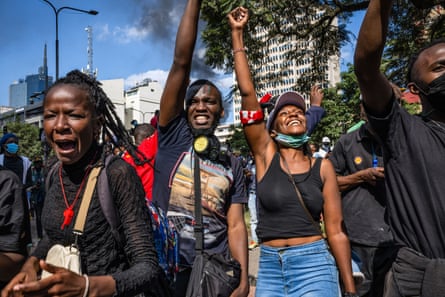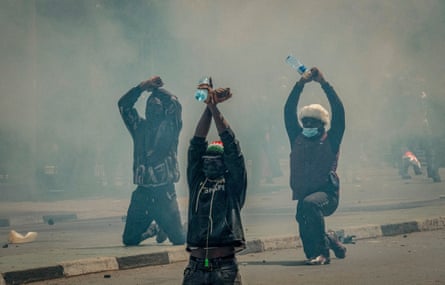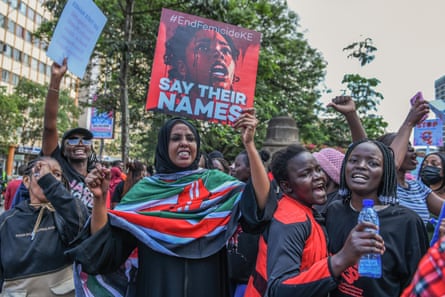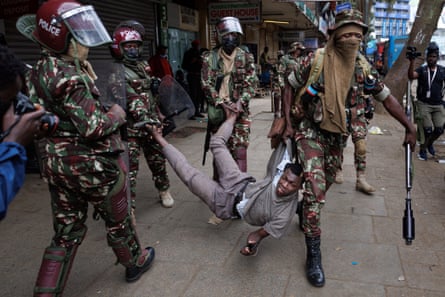Hello and welcome to The Long Wave. This week I spoke to our east Africa correspondent, Carlos Mureithi, about Kenya’s year of political protest and how a younger generation is leading the way to a more democratic future, not just for Kenya but Africa as a whole. But first, the weekly roundup.
Weekly roundup

Somalia and Ethiopia to restore ties | In 2023, Somalia severed ties with Ethiopia over a sea access agreement Ethiopia signed with the separatist northern Somali region of Somaliland. Now, both east African countries hope to “restore and enhance bilateral relations through full diplomatic representation in their respective capitals”.
Ecuador mourns ‘Guayaquil Four’ | The bodies of four Afro-Ecuadorian boys were found charred and dismembered after they had been seized by the military last month. As our South America correspondent, Tiago Rogero, reports: “Black rights activists hope the boys’ deaths could also prompt Ecuador to reconsider its racial history, in the same way that George Floyd’s murder did in the US.”
SVG’s Garifuna lay claim to sacred island | Baliceaux, a tiny private island in St Vincent and the Grenadines, was once the scene of one of the worst genocides perpetrated by the British government. It has since become a site of historical and spiritual importance for the nearly 600,000 descendants of the Garifuna people across the diaspora who oppose the island’s sale, our Caribbean correspondent, Natricia Duncan, reports.
Statue of Ghana’s ex-president destroyed | A statue of Ghana’s former president Nana Akufo-Addo has been destroyed, with the head severed and torso broken. The incident in Sekondi follows an attack on the monument weeks earlier. Many Ghanaians have objected to the sculpture, which was installed last month, describing it as self-glorification. The 80-year-old leader stepped down last week after two terms in power.
UK’s Black voters ‘disappointed’ by Labour | Our community affairs correspondents, Chris Osuh and Aamna Mohdin, have spoken to Black constituents in Liverpool Riverside and Tottenham, which have Black MPs and large Black populations, about their disappointment with the party’s return to power and persistent disillusionment with government.
In depth: From TikToks to teargas – Kenya’s digital uprising

In June 2024, protests erupted in Kenya’s capital. They were triggered by a draft finance bill that proposed tax hikes on essential items, increasing the burden on citizens already struggling through a cost of living and inflation crisis. Nairobi is not unaccustomed to protests, but these were different and shook the government. They were decentralised rallies led by gen Z that bloomed on social media platforms with innovation, wit, solidarity and anger.
“People started creating videos for TikTok, X and Facebook to educate others about how the bill would affect the regular person,” Carlos tells me. Some of these videos were in vernacular language so they could reach people in rural areas. Even chatbots were used to spread the word, he says. “Innovative people created AI language to help people analyse the bill.”
The protests were peaceful, with songs, placards and chants. But politicians dug their heels in, and the police began to use water cannon, release teargas and shoot into the crowds. Carlos says politicians thought if they “beat down a couple of people, shoot some people, just scare these young kids away, they’ll go back to their houses or behind their laptops and we will pass the bill.” The anti-protest narrative was that it was just “a gen Z problem or people behind keyboards”.
Brute repression not only did not work, it inflamed tensions. The situation changed when it became clear that politicians would not listen. On 25 June, the bill was passed, and thousands of protesters stormed parliament. In the ensuing confrontations, dozens were killed. President William Ruto called the protests “treasonous”, vowing that they would be put down. Hours after these statements, Ruto withdrew the bill. It was a stunning U-turn from a leader who, Carlos says, was used to getting his way.
‘Kenyans have lost respect for parliamentarians’

Politicians may have once been right to expect acquiescence – but these demonstrations, which were not only a backlash against the finance bill, had been bubbling longer term. “Over the years, Kenyans have lost respect for parliamentarians and parliament,” Carlos says. “Trust has been diminishing very fast because of increased corruption, borrowing from global financial institutions and passing on that liability to the citizens.”
Another problem is the lavish, in-your-face lifestyles of the political elite. “We have a generation of younger politicians who are also big users of social media,” Carlos says. “Whenever they buy a car they will film themselves to show you a garage with a number of Range Rovers and Land Cruisers. Or you will see one flashing cash on the table and counting it. This is taxpayer money. Clearly your salary can’t buy you five Range Rovers. There’s no way a clean life can afford you that lifestyle.”
That loss of respect for the political establishment and its brazen antics has been accompanied by a broader generational shift, one where it is not just the behaviour of those in authority being questioned but the very values of the status quo. This shift meant Ruto was faced with protesters who had a fight and audacity in them that he was not prepared for. Within days, despite his climbdown, further demonstrations called for his resignation. The streets had become a magnetic theatre of political participation that extended beyond the finance bill and took weeks to dissipate.
“We couldn’t wait to get out there,” Tom*, a 27-year-old protester, tells me. In “ducking the cops, getting teargassed, then regrouping” with others, he had found an almost addictive sense of political belonging. Demonstrators such as Tom are drawing power from the very measures meant to suppress them. They goaded the authorities via social media to use vape-flavoured teargas for their enjoyment. A moment on Kenyan TV went viral, where a senator asked, in recognition of the resilience and swagger of the protesters: “How do you teargas a baddie?”
“The gen Z-tech [element] was one of the most surprising to me,” Carlos says. “It wasn’t just young people in Kenya, it was also young people in the diaspora,” gathering online, “strategising about what they were going to do tomorrow” – where people would meet, in what directions they would move, how they would engage with police and de-escalate.
Young Kenyans surprised themselves with the confidence fellow protesters had “to go all the way to storm parliament. That was 100% unexpected. We are used to people protesting on the streets, fighting with the police, taking rubber bullets, but not really going into institutions of power.” Parliament, Carlos says, “is where the laws are made. People call it the August House. It’s a no-go area.”
Demands for action against femicide
after newsletter promotion

The political establishment’s credibility was severely damaged by the finance bill, but the protests also crossed a psychological hurdle in Kenyan society. It became clear that you could force politicians to act, and that the old ways of bullying and intimidation were no longer working.
In December, a series of large protests against femicide erupted in Nairobi with the same energy, youthful profile and social media mobilisation. Anti-femicide rallies had taken place earlier that year, but the “tech, grassroots organisation and social media” activism in the latest round was similar to the summer protests, says Carlos. “Femicide and gendered domestic violence is a problem that is not new in Kenya” – but such vocal anger at political inaction is unprecedented. In 2023, almost 100 women were killed in just three months, but the government has not even acknowledged the crisis, let alone addressed it.
The gap between the streets and the halls of power is a generational one. “You will find a lot of older politicians blaming the victim,” Carlos says, “saying that in order to eliminate domestic violence or reduce cases of rape, people need to dress a certain way, stop wearing miniskirts, don’t get drunk so men don’t take advantage of you.”
The protests were also heavily policed by a political regime still reeling from the summer unrest, with teargas, harassment and arrests – a sharp contrast to the communal feeling of the crowd who sang, waved Kenyan flags and displayed pictures and called the names of the dead. The police response – to dismiss, crack down, then inflame – was an echo of that to the finance bill, despite its failure.
Arrests and abductions

Since the summer protests, a wave of abductions of activists and government critics has sharpened the confrontation between the political establishment and a diffuse but stubborn opposition movement. Again, the suppression has not been taken quietly, resulting in more anger, rather than fear. Part of the reason, Carlos says, is that the abductees are “really young people. Kids in university, or just young people looking for jobs.”
What these youths have in common is that they are “really savvy and know how to use technology” in ways the government is threatened by. Their abductions have touched a nerve in the country and “helped other Kenyans to empathise”, Carlos says. Young people are seen as the most vulnerable, rather than the disruptive agitators the government portrays. “People now look at the president and those in power as animals. Now you are going after children who have drawn a caricature of you on social media. If you can’t handle a cartoon or a funny joke about you, then you are really intolerant and weak.”
And once again, the strength of feeling among the public is something the government did not anticipate, with a number of releases of abductees in the past few weeks followed by authorities claiming their kidnappings, and even killings, were the work of “rogue” parties.
Breaking with the past

It will not be enough. A new model of political pressure and opposition is building, one that, according to Carlos, is only going to “grow and grow” as a new generation breaks with the past. One of the ways that political authorities have tried to fight this emerging movement is by leaning on old scolds and rebukes that African youth across the continent are familiar with.
“When these kids were being abducted, a lot of older politicians were talking about the fact they didn’t have respect for their elders,” Carlos says. “It really shows the age gap and goes back to this notion that when you are a child and an elder visits the home, you need to behave. The young people are like: ‘We don’t care. It’s not about showing you respect. You’ve stolen from us. You’ve killed us. So you don’t have respect for us. What respect are you talking about?’”
*Name has been changed to protect his identity.

.png) 3 months ago
45
3 months ago
45













































